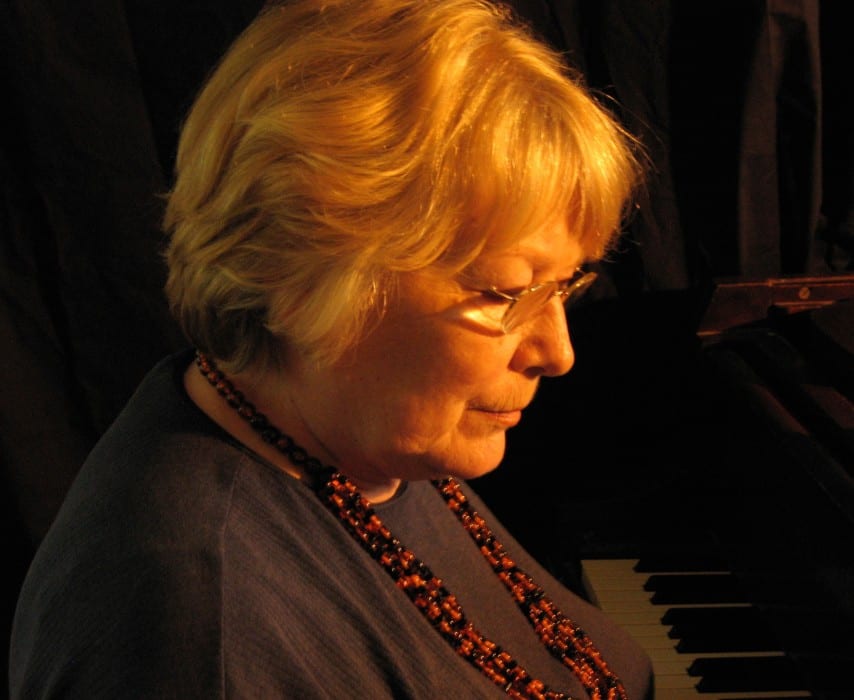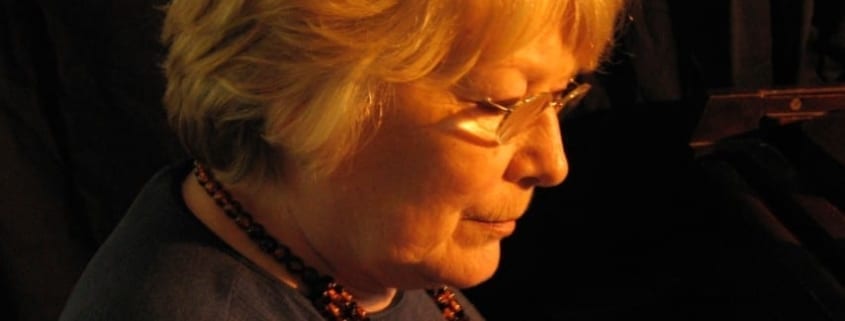
Joan Wildman, Professor Emeritus of Jazz Studies at the Mead Witter School of Music, passed away April 8, 2020. She was 82 years old.
Born January 1, 1938, Joan grew up on a ranch near Spalding, Nebraska as an only child. She credited her friendship and mutual appreciation of blues and ragtime with the nearby Glaser family (the same Glaser brothers who went on to form Glaser Sound Studios in Nashville) as a major influence on her own career.
A major influence herself on generations of jazz musicians throughout Madison and beyond, Joan played an especially critical role in establishing the current jazz studies program at the school. Known to deftly explore the area between structure and improvisation, Joan was a professor of music at UW from 1978 through 2002 specializing in music theory, jazz improvisation, and jazz piano.
Double bassist Hans Sturm recalls Joan’s “uncompromising” approach to her music. Hans came to UW-Madison in the early ’80s to study with Professor Richard Davis, and eventually started playing in the Joan Wildman Trio.
“She was a big reason why I stayed in Madison for so many years,” Hans said. “Working with Joan really changed a lot of my concepts with music.”
While she was a classically trained pianist, Joan charted new territory and created her own sounds. She was an early adopter of the Yamaha DX 7, a digital synthesizer that allowed her to experiment with true crescendos and sustained attacks. Joan was also an early pioneer of crafting exceedingly long loops on her computer and emulator, often 80 to 90 bars long with 20 bars of silence and a groove the trio would play along with.
“She was fearless in her music,” Hans said. “We would rehearse for hours, and there might have been some intricate plan, but all that would disappear during the gig and the piece would take another shape. It was about where the music would take us. That’s kind of how Joan lived her life.”
Founder of the Madison Music Collective, a nonprofit jazz organization, Joan had a knack for bringing musicians together and promoting their work, a skill Hans said can’t easily be replicated.
Though she performed less later in life, Joan was an active performer both nationally and in the Madison area. She led her trio for over 25 years, producing recordings such as Orphan Folk Music (1987), Under the Silver Globe (1989), and Inside Out (1992).
One of her more recent releases was the 2015 album Conversations, a live recording with longtime friend and frequent collaborator Joe Fonda during a celebration of Madison Music Collective’s 30th anniversary at the Brink Lounge.
Madison writer Dean Robbins often covered Joan’s work and many of the trio’s performances over the years.
“Joan loved experimentation, but hers was the kind that drew listeners in rather than shutting them out,” Dean said. “No matter how far she strayed from conventional forms, she never lost sight of blue notes, swing rhythms, and other sensual pleasures associated with jazz. She even gave the synthesizer a human warmth, the notes melting under her touch. In this way, Joan’s sounds matched her spirit: big-hearted, soulful, searching. Like her hero Duke Ellington, she made idiomatic American music that perfectly balanced passion and intelligence.”
Joan was equally adept at creating computer-generated animations, web pages, and computer-generated drawings. Her extensive overview of jazz history and styles formed one of the first web pages in the country, a site that incorporated multi-media animations, sound and static visuals, and hyperlinked text.
Before coming to Wisconsin in 1977, Joan received her Doctor of Musical Arts degree from the University of Oregon and had previously taught at Central Michigan University and at the University of Maine, Fort Kent. She is the first and only member of her extended family to have achieved a doctoral-level degree.
“Joan gave so much to the School of Music,” Director Susan Cook said. “She was a path-breaking composer and performer in jazz, and with her colleagues and students, she was a dynamic force in the Madison jazz scene. Personally, she was a mentor to me when I joined the faculty in 1991, and in her retirement she continued to take an active interest in the school and lend her support.”


